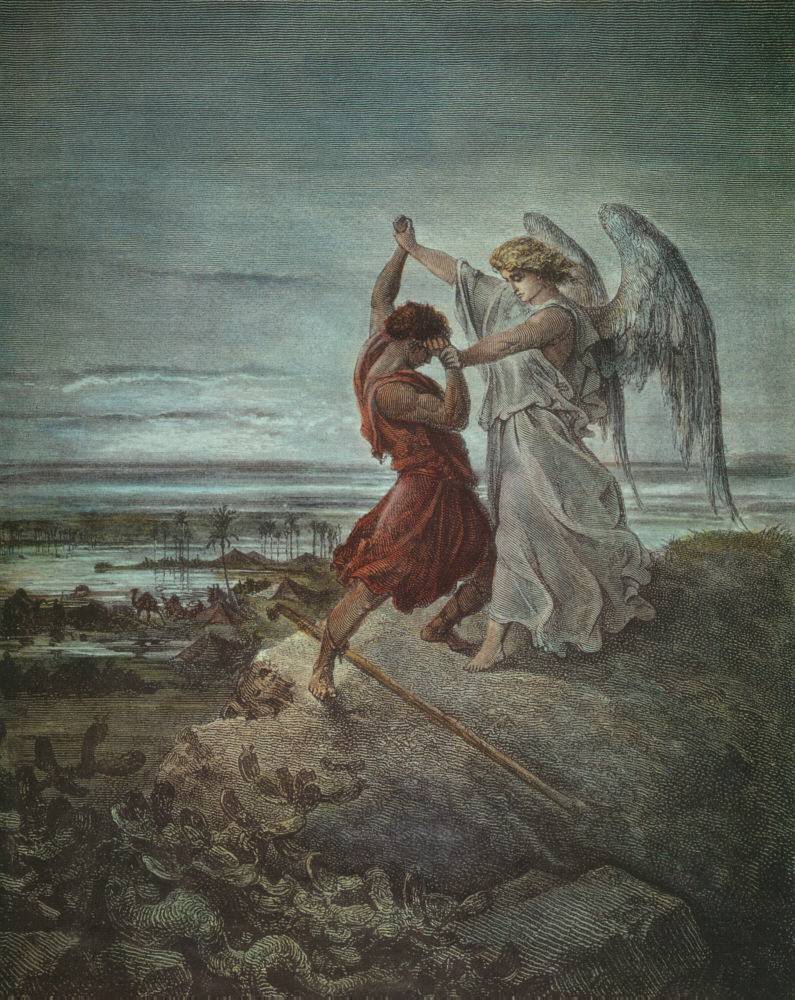
There’s an old Jewish joke about a rabbi who made a habit of reading the anti-semitic German tabloid Der Stürmer. When one of his congregants asks why on earth he would choose to read such a thing, the rabbi replies: “When I open the Jewish papers, I see attacks, deaths, looting and evil laws. But then I open Der Stürmer and I see that we Jews control the banks, the film industry, the courts… it cheers me up!”
Nowadays, Jewish misery porn exists in the form of a private Facebook group called Jewish Britain (subtitle: “The beating heart of British Jewry”), created in January 2014. I’ve been a member of this group for some years, partly out of morbid fascination and partly out of a forlorn desire to see it change. Because, from what I’ve gathered, many of the group’s 11,000 members experience life as a Jew in Britain as a never-ending torment.
“YES, tell the national media,” urges one commenter. “YES, fight this in the small claims court. Do everything you can to get this publicised or it will start happening to others!” The injustice in question? A parking ticket received the day after Yom Kippur.
Bottomless hatred
Besides parking wardens, the group’s many perceived enemies include Palestinians generally (“Bloody awful things”), Palestinian citizens of Israel specifically (“Should be forced to leave”), British Muslims (“Will someone from these communities explain to the indigenous population just why they’re here?”), non-Orthodox Jews (“I wonder if there is a way to have them forbidden from using the term ‘Jewish’?”), left-wing Jews (“driven by deeply-engrained self hate”), the liberal Zionist organisation Yachad (“a danger to Israel”), Amnesty International (“monstrous”), students (“I just wish we could turn back time and place some of these students in the death camps”), Ukrainians (“Zelensky is acting like a spoilt child, his country has never helped Israel”), the Scots (“I distrust anything Scottish until proven innocent”), the Irish (“the Palestinians of the UK, living in a fantasy world of delusion and lies”), Icelanders (“They should freeze to death, intellectual retards”), Germans (“still Nazis at heart”), refugees (“The thought of sharing my home with foreign strangers doesn’t even bear thinking about!”), rape survivors (“publicity seeking”), trade unions (“hard-left goons”), Tesco (“any excuse to stop selling kosher products”), the British Jewish leadership body the Board of Deputies (“A load of ratbags”), Ofsted (“closing Jewish schools to satisfy the woke mob”), the BBC (“They’re telling us, the good times are over for Jews in this country”), The Guardian (“Goebbels would have been proud”), the liberal Israeli news outlet Ha’aretz (“not a newspaper, a political publication with a strong bias”), Facebook (“most of its moderators are ex-Daesh”), Wikipedia (“written by the hands of Islamists”), people who believe in climate change (“soft and woolly-minded”), people who struggle with their mental health (“Maybe the psychiatrist should administer a quick cure shock treatment like a punch to the head!”), queer people (“Heterosexual marriage is now regarded as an oppressive ideology in woke thinking”), Meghan Markle (“put her in a leaky boat and out to sea”) and women (“Stick to being a clothes hanger, lying bitch”).
As absurd and ridiculous as this paranoia sounds, it is, of course, also dangerous.
“Black people hate us,” laments one poster, “notwithstanding our generally liberal views, particularly with respect to racial minorities.” This comment went on to explain that leftists, the far right and white Christians also despise Jews – more or less everyone, in other words.
“Younger black people, non-professional, have had the usual anti-semitic stereotypes drummed in through music heroes,” explains another group member. “They think we are all rich and miserly.” (This poster helpfully added: “I have worked in and around Notting Hill for over 50 years and I know what I am talking about.”)
In one case where a group member used the N-word, admins took stern disciplinary action, banning the offending member from posting… for five days.
Interestingly, among the group’s foremost targets are other Jews. Conspiracy theories about “cultural Marxism”, assertions that the Jewish community has sufficient “economic and political clout to bring the BBC to its knees”, jeering at elderly victims of anti-semitic violence for “cowering instead of trying to fight back” – the amount of plain old anti-semitism in Jewish Britain is extraordinary.
Meanwhile, those who we might intuitively recognise as enemies of the Jewish community are often pardoned. Take the chair of Enfield Southgate Conservative Association, recently suspended after pictures emerged showing him in Nazi uniform. “Perhaps this is taken out of context, don’t we dress up as Haman on Purim?” one member asked. It is difficult to imagine a Labour politician, or a Muslim one, being indulged so readily.
Compulsively reading these comments, I find myself wondering: why are the people in this group so extraordinarily hateful?
Powerless and joyless
The American Jewish journalist Lisa Goldman suggests one answer: “We Jews carry our historical baggage heavily. We see a rejected handshake and we think of Nazi concentration camps, Russian pogroms or the Munich massacre.”
A powerful sense of fragility borne of history underpins many of the posts in Jewish Britain – an honest belief that Israel’s future hangs by a thread, that any foray into Edgware could lead to an encounter with a murderous Muslim.
But there are two other factors that are necessary to convert historical vulnerability into Facebook extremism.
The first is a sense of powerlessness. There is little that the average British Jew can do to combat anti-semitism, from the Middle East to Paris. Mouthing off on the internet feels like action; it allows the poster to tell themselves that they have taken a stand.
The second is more serious: joylessness. These are people whose Jewish identity brings them no cheer, no comfort, no naches.
Jeremiah prophesied: “In this place which you say is ruined, there shall be heard the voice of mirth and gladness.” But this group’s members seem not to have spotted that verse. Their Judaism is not about joy; it is a legacy of persecution. The left hates us, the right hates us, the Blacks hate us, the whites hate us. For them, there is no safety for Jews anywhere, especially not in the UK – not when we’re at risk of bumping into an Icelander, or wandering into a Tesco.
This sense of joylessness is stoked by various “anti-anti-semitism” organisations. A recent example is a Campaign Against anti-semitism press release decrying a Southampton primary school for failing to teach the full breadth of Judaism as part of its religious education syllabus, instead only teaching about Shabbat, Sukkot, Channukah and Pesach. This kind of misplaced outrage ignites the fragile touchpaper of groups like Jewish Britain, when just a moment’s thought should tell us that primary education about four Jewish festivals is something to be celebrated, not regarded as a threat.
Restoring Jewish joy
How to clean up the mess Jewish Britain has made? With a carrot and a stick.
The stick is simple: make membership of Jewish Britain a disciplinary offence by every communal body. Our community is rightly outraged when Labour party members are found to have been part of groups on social media where anti-semitic content routinely goes unchallenged, and we must hold ourselves to the same high standards. (The same should apply to membership of Jewish Britain’s splinter group, Jews In Britain – also known as the People’s Front of Judea – whose content is just as bad if not worse.)
The carrot is more complex: restore joy to Jewish media.
The Jewish press must raise its threshold for reportage of unfortunate events. A single anti-semitic tweet by a local councillor does not justify three columns, and we should see a good-news story on a front page once in a while. Is it any surprise that there are people who experience being Jewish as a scary ride when recent Jewish News cover stories include “Britain left us to rot in Belsen”, “Homework derailed by online Holocaust denial” and “Auschwitz is part of Met Police ‘banter’”?
This is part of a vicious circle: people read the Jewish press, get scared, reconfigure their Jewish identity around a sense of mortal danger, then expect more of the same. That cycle of contrived misery can be broken by a shift of focus towards the myriad positive aspects of being Jews in modern Britain.
Jewish communities must also work to break out of their bubbles and strengthen links with other racialised and minority communities across Britain. Every synagogue should be either visiting, or being visited by, a local church – especially predominantly black churches – and a local mosque at least twice a year. Even if Jewish Britain’s members are not shul-goers, the message will filter through eventually: it is not true that everyone hates us.
Someone in Jewish Britain once posted: “If you try cohesion with a crocodile, it will bite you.”
It’s interesting that they chose the crocodile rather than another animal. Rabbeinu Chananel, an 11th-century commentator on Torah and Talmud, argues that the crocodiles we have today are descended from the plague of frogs that G-d sent to Egypt while the Israelites were enslaved there. In other words, crocodiles are our friends. They were created by the same Creator as we were, and they only came into being in order to help liberate us.▼
Rabbi Gabriel Kanter-Webber was ordained by Leo Baeck College earlier this month.
Author

Gabriel Kanter-Webber was ordained by Leo Baeck College earlier this month.
Sign up for The Pickle and New, From Vashti.
Stay up to date with Vashti.



